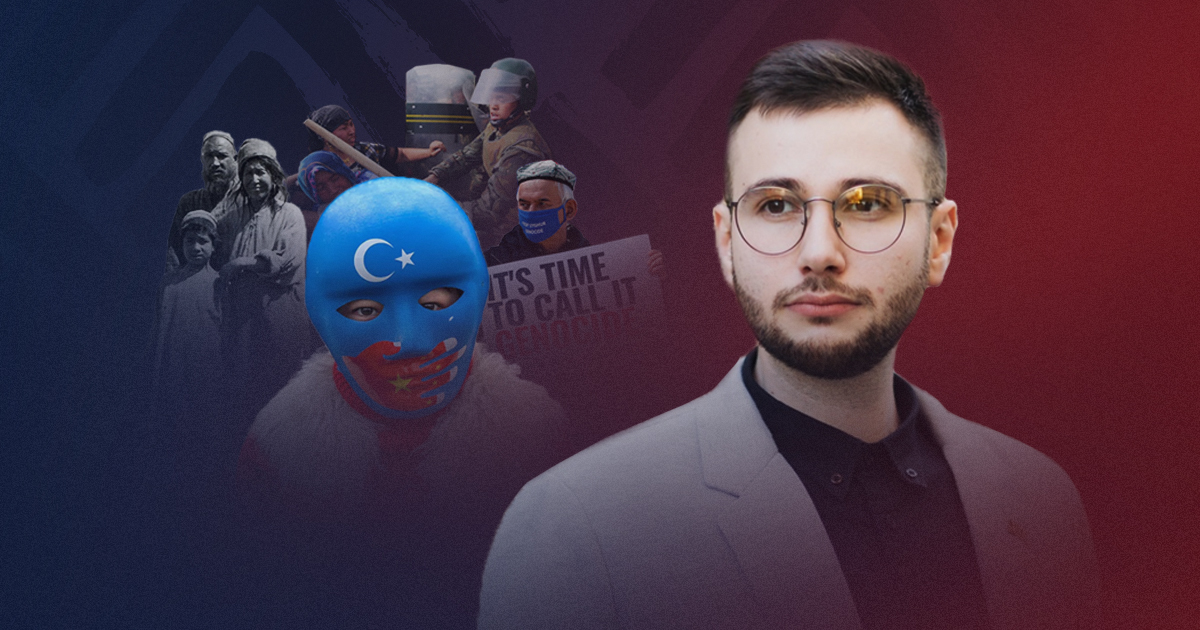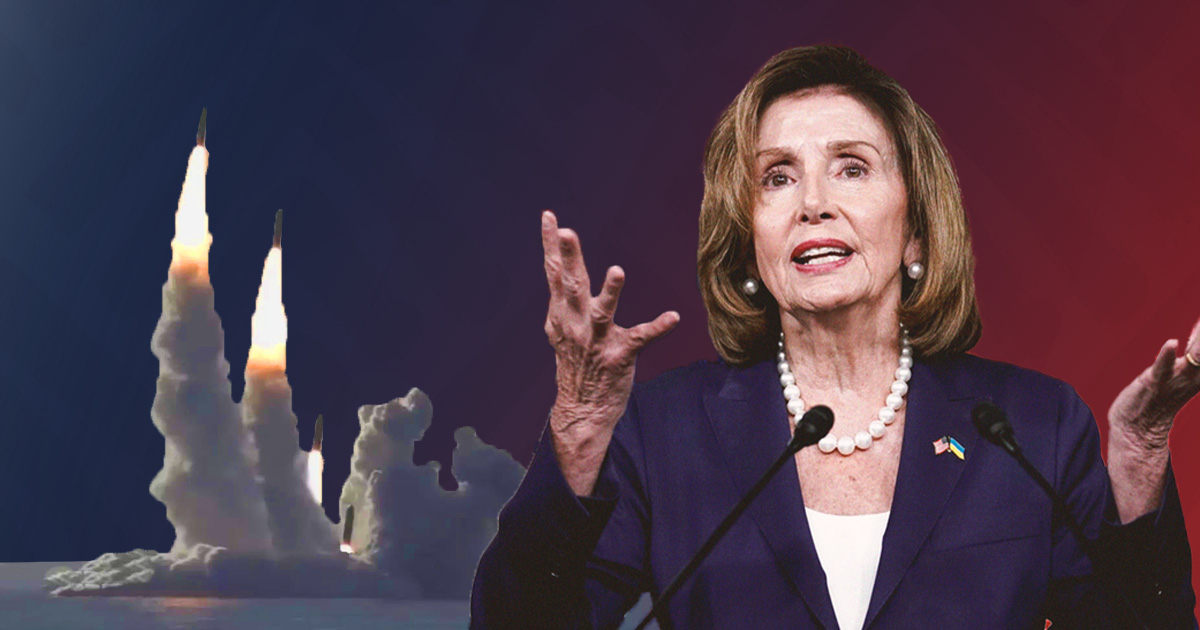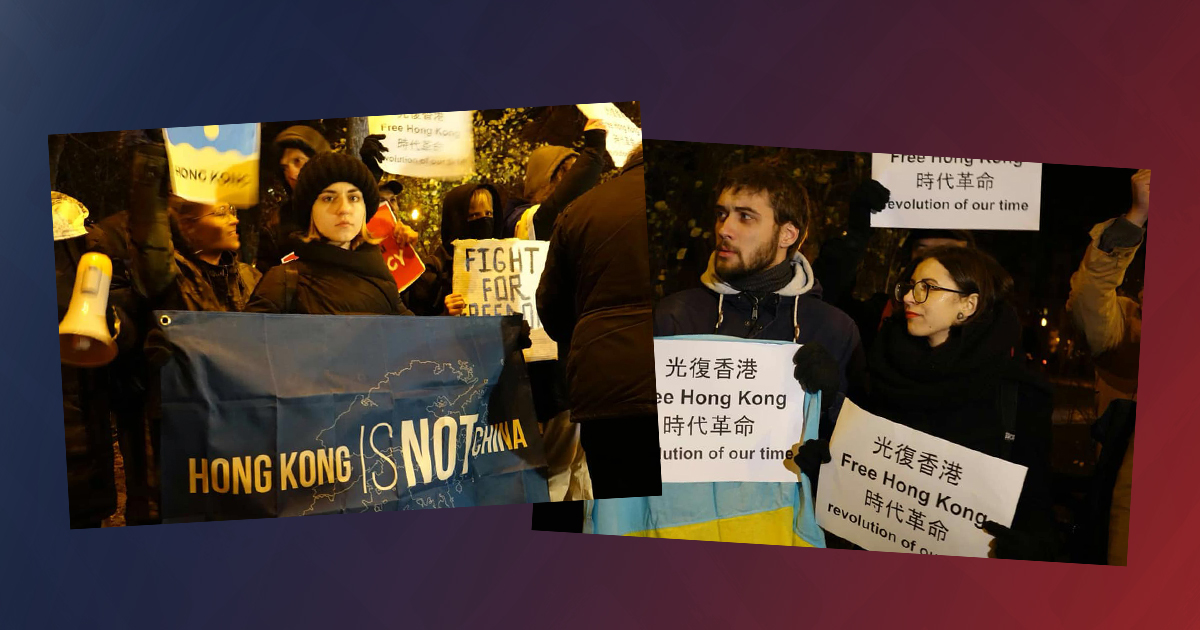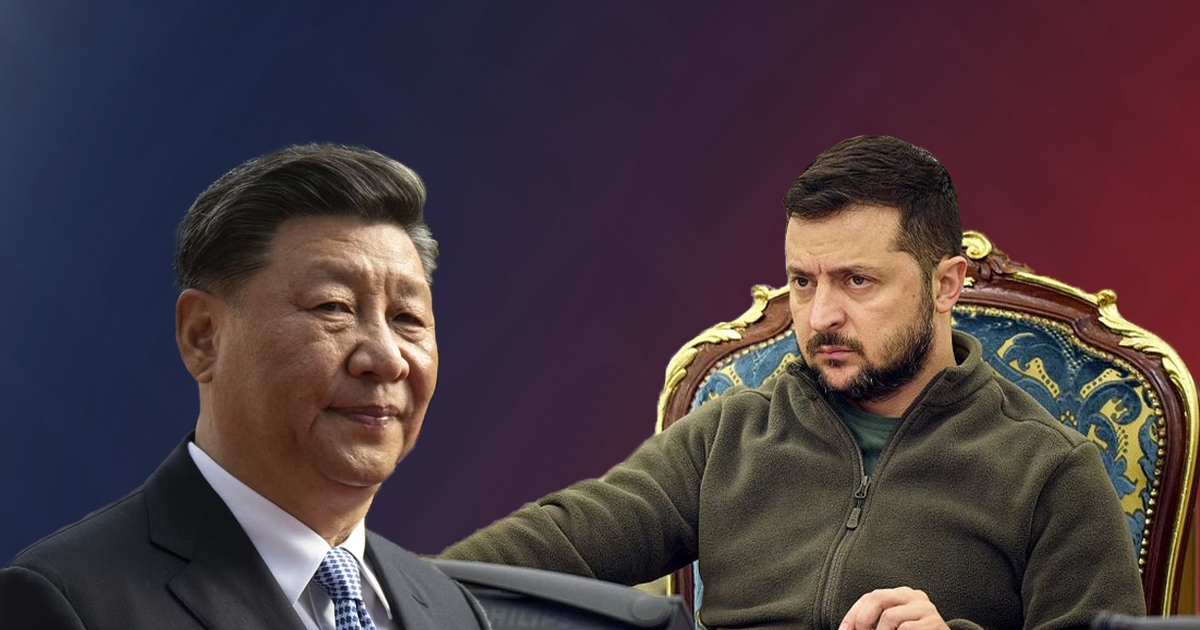"Ukraine is not ready to recognise the Uyghur genocide, even though it is trying to get the Holodomor recognised as genocide" — Artur Kharytonov

Artur Kharytonov is an activist, president of the Liberal Democratic League of Ukraine, an NGO that protects and promotes inalienable human rights and freedoms, their social, economic, creative, cultural and other interests, and the primary coordinator of the Free Hong Kong Centre initiative.
"Svidomi spoke with Kharytonov about the current situation between China and Taiwan, what is happening in Hong Kong after the mass protests of 2019, the Uighur genocide and Ukraine's position on the international stage on the issue.
What is happening now between China and Taiwan? Is there a threat of an attack in the near future?
— The situation has remained unchanged over the past year. China resorts to individual military provocations - it violates Taiwan's water and air spaces, but this does not lead to anything. The most significant aggravation occurred during Nancy Pelosi's visit to Taipei (the capital); China then conducted exercises and fired a ballistic missile that hit Japanese territorial waters. It can be said that a cold war is ongoing between China and Taiwan. However, so far, Taiwan has not curtailed trade with China.

What impact will China's attack on Taiwan have on international security? Is it possible to assume that the issue of Taiwan will be more acute for the West than that of Ukraine?
There is no point in comparing because the situations are entirely different. We don't know when the war [between China and Taiwan] will happen. Many analysts are inclined to believe that it will take place in 2026-2027.
The American Centre for Strategic and International Studies recently published a report where analysts predicted how the confrontation would take place. They believe that in the end, the Chinese fleet will be destroyed in the end, and Taiwan will win despite significant destruction and losses.
I am critical of such predictions because all the forecasts about Ukraine have not come true except for the moments of significant destruction, but this is obvious. However, the dates of 2026 and 2027 are worth looking at closely.
I hope that by this time, the war in Ukraine will be over. If an attack occurs before the end of the Russian-Ukrainian war, we cannot say Taiwan will turn its attention away from Ukraine. The situation here is entirely different — the US has no obligations to Ukraine. Ukraine borders on NATO, which is not ready to take sides, but provides the necessary weapons.
The Asia-Pacific region does not have its own NATO. Instead, the key players are Japan, South Korea and Taiwan. The United States has a commitment to Japan to enter the war in case of an attack on it and partially has a commitment to South Korea.
Military experts are inclined to believe that a full-fledged attack on Taiwan is impossible without affecting Japanese territory. However, if, for example, a Chinese missile falls on one of the Japanese islands, the United States is obliged to intervene.
If China and Taiwan were to fight one-on-one, it would be difficult for the US to support Taiwan in the same way as Ukraine, as it has no land border and no rear. That is why the United States is so concerned.
It is also considering the option of South Korea getting involved in the war considering US military bases there and North Korea, which could attack Japan. Then the war ceases to be a conflict between two countries.
Can we say China has taken an "observation position" in the Russian-Ukrainian war?
China is indeed studying Russia's negative experience, adjusting its army and doctrines. However, they are actively taking the Russian side, and 2022 was a good year for the multilevel Sino-Russian partnership.
China is now the primary way the Russian economy and financial machine keep Russia alive. If it were not for China's support, the effects of the sanctions would have been more severe. They also conduct joint military exercises.
Back in 2021, I talked about the danger of the Army Games, which were held by Russia and in which China participated (held from 22 August 2021 to 9 September 2021, with the participation of about 40 countries - ed.) As Slidstvo.info journalists found out, the training on using Shaheds took place under cover of these games.
Also, in 2021, Russia and China conducted military training in East Turkestan, where the Russians switched to Chinese equipment for the first time.
What is happening in Hong Kong now? How has the situation changed since the protests in 2019?
I call what happened after the protests ended and the pandemic began a "hybrid occupation" of Hong Kong. China has violated all international agreements, the Hong Kong constitution and its obligations by introducing the so-called "national security law". This law destroyed freedom and democracy.
Within months, China launched a crackdown on democratic representatives, some in prison and others in exile in Canada, the United States, the United Kingdom and Australia. Hong Kongers who came to Ukraine after the start of the full-scale Russian invasion said they were now studying the experience of the UPR in exile.
Also, all free media in the city were closed. Entire democratic Hong Kong has been destroyed. This is somewhat reminiscent of the Russian occupation of Crimea, and there is no hope that changes will occur. The paramilitary police have been deployed there, and Chinese troops stationed in Shenzhen are ready to enter Hong Kong. The city is occupied and paralysed.
Can the UK put pressure on China over Hong Kong?
It is a serious legal issue. I spoke to local lawyers about it, and we came to the conclusion that the Hong Kong handover treaty is not complete (the UK handed Hong Kong over to China on 1 July 1997, having signed the 1984 Sino-British Joint Declaration on the Handover of Hong Kong — ed) In fact, China began to violate the guarantees it had pledged to provide until 2047 in 2003.

Due to China's failure to fulfil the conditions, the UK can unilaterally terminate the Hong Kong handover agreement due to Chinahis is possible.
The interesting point is that the successor to the Chinese Empire, which once entered the Hong Kong lease, is the Republic of China, formally located in Taiwan. Although Taiwan does not consider itself China, it has the rights of the PRC. And in fact, Taiwan can claim Hong Kong. So it can be legally reviewed but could lead to a breakdown in relations between Britain and China.
Such an aggravation is not beneficial to Britain from an economic point of view. In the past, when Boris Johnson headed the British Foreign Office, he favoured Hong Kong but did nothing specific in this direction.
China is pursuing a policy of enslaving peoples. Which regions suffer most from this policy, and what actions does the Chinese leadership take?
These are multi-level crimes committed against all the peoples of China. It is essential to understand that China does not exist as such. China is a concept, just like Russia.
Conventionally, we have historical China, an island in the Huang He River Delta, and the rest of us are not Han Chinese (Han is the main ethnic group in China - ed.). China Hanizes and communalises Tibetans, Uyghurs, Mongols, Manchus, etc. While in Tibet and South Turkestan, massive crimes against humanity are being committed - language, culture, and religion are being destroyed, and Muslim and Buddhist symbols are being replaced with Xi Jinping, Mao Zedong, Marx, Engels and Lenin.
The PRC is trying to erase the identity of people, for example, persecuting teachers who teach the Tibetan language and forcing Uyghur women to marry Chinese men to create a "pure nation". In addition, there are concentration camps in Tibet and South Turkestan.
Ukraine did not support the discussion of the Uyghur genocide at the UN. You called this position shameful. Why did the Ukrainian delegation do this?
Ukraine later returned to the debate but still did not have enough votes to support the resolution. It is an unprecedented situation.

China denies the genocide and the existence of concentration camps, just as the USSR did not recognise the Holodomor. Instead, the entire Chinese propaganda machine focuses on creating a picture of a happy Xinjiang (the Chinese name for East Turkestan — ed.).
The world is beginning to understand what is happening there because many Uyghurs have escaped and told about China's crimes. The most democratic countries in the world are beginning to recognise China's actions against the Uyghurs as genocide - if not at the government level, then at the level of parliaments. Yet, in Ukraine, no one is ready to recognise the Uyghur genocide, even though we have been trying for years to get the Holodomor recognised as genocide.
Ukraine's only concern is that we fear China and the Communist Party of China. We believe that if we take the position of the Uyghurs, we will lose some benefits from China. Is this a worthy policy? I think it should be left to the public to decide.
Given this position, will it not be difficult for Ukraine to seek recognition of Russia's crimes, particularly against Crimean Tatars, in the future?
I don't think this will change the situation in any way. These are parallel processes. The Crimean Tatar community, particularly the Mejlis and the Crimean Tatar Resource Centre, cooperate with the World Uyghur Congress.
Don't you think that in Ukraine, there is little talk about China's crimes and only a focus on its economic development?
The situation is already changing. If someone in Ukraine starts promoting a pro-Chinese thesis, they are quickly condemned. Working with China is becoming an image and reputationally unprofitable. It is a good sign. But our criticality towards China is not enough, and therefore we need to have a broader range of media coverage.
If, for example, a Ukrainian TV channel showed a 45-minute story about the Uyghur genocide, Ukraine's attitude towards China would change. No one would buy cheap elections from AliExpress made by Uyghurs.
Ukrainians know what the communist genocide is at the level of cultural memory. The main obstacles are the reluctance to cover the issue and the lack of an expert circle.


